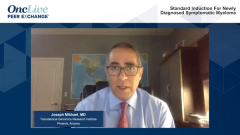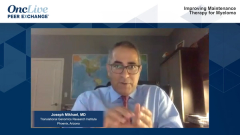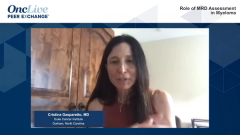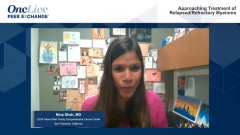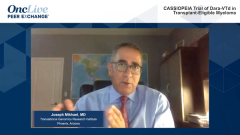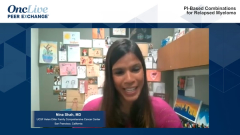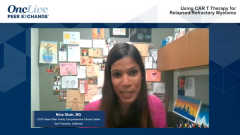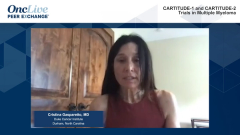
PI-Based Combinations for Relapsed Myeloma
A review of data from key clinical trials, including CANDOR and IKEMA, for relapsed/refractory multiple myeloma.
Episodes in this series

Keith Stewart, MD, ChB, MBA: Nina, let’s stay with you. I’ve always thought since both carfilzomib and daratumumab came along that it shouldn’t be one or the other. It should be both because they’re such incredibly powerful drugs in myeloma. We have a couple of studies that I’d like you to describe for the audience and give us your thoughts on. The CANDOR study was carfilzomib plus daratumumab, and the IKEMA study was isatuximab plus carfilzomib. What are your thoughts on those studies and whether you would use those combinations? I think they’re both FDA approved now.
Nina Shah, MD: The combination of an anti-CD38 antibody with carfilzomib is very potent, and in the CANDOR study carfilzomib, daratumumab, dexamethasone was compared to carfilzomib plus dexamethasone. Interestingly, there was a very impressive PFS [progression-free survival] of 28 months for the triple-combination arm, which I thought was great. The subgroup analysis, and one of the few, showed a benefit for people who have high-risk disease. It’s one of the only studies I’ve seen where the high-risk group still benefited from the experimental arm, so I was impressed with that. For the IKEMA study—that’s isatuximab, carfilzomib, dexamethasone vs carfilzomib plus dexamethasone—again, it met its primary end point in 1 to 3 prior lines of therapy. Their PFS, I believe, has not been reached yet, but it’s going to be in that same neighborhood. So you have 2 different regimens that are looking at combining the CD38 antibody plus carfilzomib, and you’re getting a PFS of around 28 months, and the control arm PFS is about 12 months or greater. That’s what the APOLLO study had for the DPd [daratumumab, pomalidomide, dexamethasone], 12 months of PFS. So, adding the CD38 antibody to carfilzomib is very potent. When I see the data, I’m thinking to myself, “Why don’t I do that every single time?” I think I don’t because of user friendliness, because it’s a pretty good dose of carfilzomib, 56 mg twice a week, to get to where they were in the clinical trial.
Keith Stewart, MD, ChB, MBA: For practical use, would you ever use 56 mg twice a week anymore, or would you use once a week?
Nina Shah, MD: I would do once weekly. As you know, we can safely do 70 mg per m2 weekly.
Keith Stewart, MD, ChB, MBA: Cristina, if you use those 2 drugs together, I’m particularly interested in whether you’ve seen any toxicity of that combination.
Cristina Gasparetto, MD: With carfilzomib, we’re always concerned about the signal with the cardiotoxicity. To use it in an older patient, sometimes with a heart condition, is always questionable. But at the end of the day, when we have an aggressive myeloma, we end up using the drug. I have to say, the cardiomyopathy and the congestive heart failure, we used to see at the beginning, even when carfilzomib was first approved. I used to see that. But now, for some reason, we are following patients more closely, and monitoring with a weekly administration. I don’t think that signal is so pronounced and concerning like it used to be in the past. But we see the myelosuppression as well, the risk of infection, particularly with the daratumumab combination, so we have to be concerned.
Keith Stewart, MD, ChB, MBA: I’m glad you mentioned the infection because I was wondering about that. These are very powerful immunosuppressive drugs, with a lot of hypogammaglobinemia. How are you handling that? When you start somebody on those 2 drugs together, do you put them on antibiotics? Do you use IV [intravenous] gamma globulins if you have to? What are you doing?
Cristina Gasparetto, MD: I try to use the IVIG [intravenous immunoglobulin] supplementation, however, lots of the time we have issues with insurance approval, I have to say. I don’t necessarily use antibiotic prophylaxis for everybody, but I’m thinking about the signal with pneumonia and infection. The risk for an infection is there, so it’s definitely something to consider.
Keith Stewart, MD, ChB, MBA: Is anybody doing more routine antibiotic use, Sagar, in these patients?
Sagar Lonial, MD, FACP: Yes. Most of our folks, because of dexamethasone, are getting Bactrim 3 times a week anyway. That’s probably sufficient for a lot of them. We’re not routinely giving IVIG unless people have had 2 infections within a short period.
Keith Stewart, MD, ChB, MBA: Is anyone using a quinolone? We’ll go back to newly diagnosed patients, is anybody using levofloxacin routinely?
Cristina Gasparetto, MD: No.
Transcript Edited for Clarity


